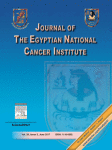Background :A controversy of the role of Epstein-Barr virus (EBV) infection in breast carcinomas has been reported in the literature. Objectives We carried on this research to explore possible association between EBV infection and breast invasive ductal carcinoma (IDC) in Egyptian women attending our center. Study design This study carried out at Sohag university hospital on 84 paraffin embedded samples of breast tissue, of them 42 breast IDC as the case group and 42 breast fibroadenomas as the control group. Nested PCR and immunohistochemistry (IHC) done separately for all samples to identify the Epstein-Barr nuclear antigen-1 (EBNA-1) gene and EBV latent membrane protein-1 (LMP-1) respectively, in breast cancer cells and controls. Results Specimen considered positive when both (EBNA-1) gene and LMP-1 were detected using PCR and IHC separately for the same sample, this was achieved by 10/42 (23.81%) of breast IDC (case group) and 6/42 (14.29%) of breast fibro-adenomas (control group) (P-value = 0.4). Nodal involvement was the only parameter that demonstrated a significant statistical relationship with EBV presence in cancerous tissue with p-value = 0.003. Conclusion Our research could not find a significant statistical association between EBV infection and breast IDC in Egyptian women attending our center, but, there might be an association between the existence of EBV and tumor aggressiveness.


